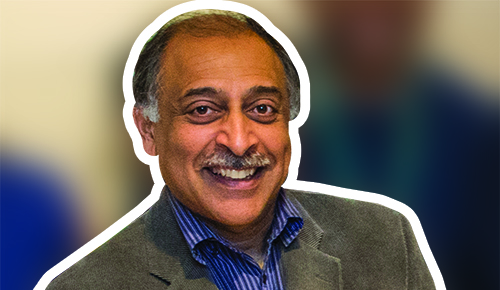
Khalid Aziz is a champion of teaching and applying quality improvement methods in healthcare environments.
With the health of patients on the line, healthcare providers are always striving for better patient outcomes-from reduced surgical complications to shorter hospital stays and everything in between.
But, as anyone who has ever made a New Year's resolution knows, it takes more than good intentions to bring about any kind of change. When it comes to changing patient care, quality improvement (QI) provides tools to make lasting change. "It's foundational," says Khalid Aziz, a neonatologist and professor. He explains that QI-a concept that comes from industry-is a systematic approach to measuring and analyzing efforts taken to reach goals. "It's not as important what you improve, it only matters that you're trying to make that improvement," he explains.
QI can seem rather mysterious to physicians since, historically, it hasn't been part of a physician's training-but Aziz is working to change this. Last year, he began teaching workshops to both resident physicians and faculty ain the department. "It demystifies it and gives them tools to use," he explains. The program he teaches is called EPIQ (Evidence-based Practice for Improving Quality) and it applies QI principles to healthcare environments. He leads the team that standardized the educational program during 15 years of multi-centre trials that showed the application of QI could improve outcomes in Canadian neonatal intensive care units.
EPIQ is translatable to any area of healthcare-and any health-are system, he says. Recently, Aziz finished a five-year University of Alberta project in Ethiopia that used EPIQ to enhance the capacity of the health-care system's newborn and maternal care providers. The project involved teaching rural midwives, nurses, and allied health practitioners skills and knowledge-everything from infant resuscitation techniques to infection control-while training them in QI to ensure the skills would be practiced in the field and passed on to others.
However, QI is ineffective without buy-in from stakeholders and engagement is a big part of the approach. "If everyone believes washing your hands when you enter a baby unit is the most important thing, everyone would be doing it already," he says. And large-scale improvements-like reducing maternal and infant mortality rates-can require engaging with an entire healthcare culture.
Aziz explains that in Ethiopia, the government has built a large number of healthcare centres to provide safer alternatives to giving birth in the villages. Getting more women out to these clinics has required engaging the entire community in the benefits of giving birth with a skilled birth attendant. As a result, Aziz has been helping to create a public service announcement in the form of a catchy pop song and music video. "The goal is to start a dialogue in the community about these decisions," he says. "I think the song has a very powerful message and will be widely played in Ethiopia."